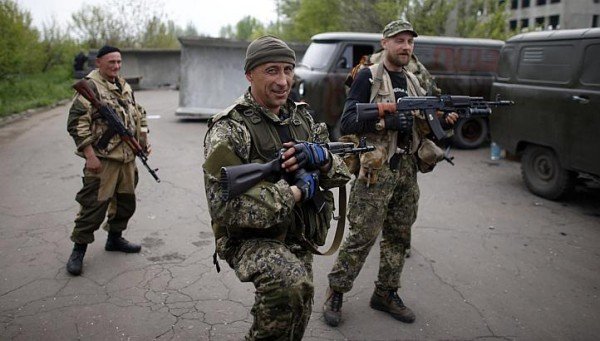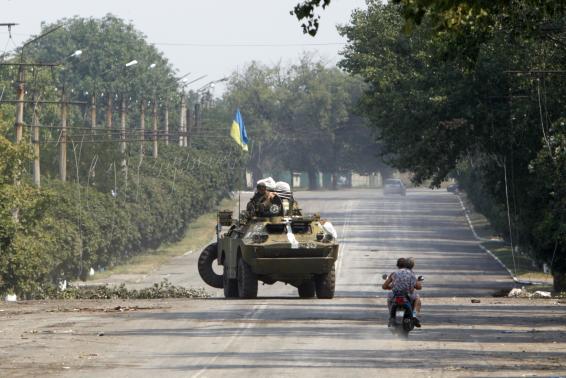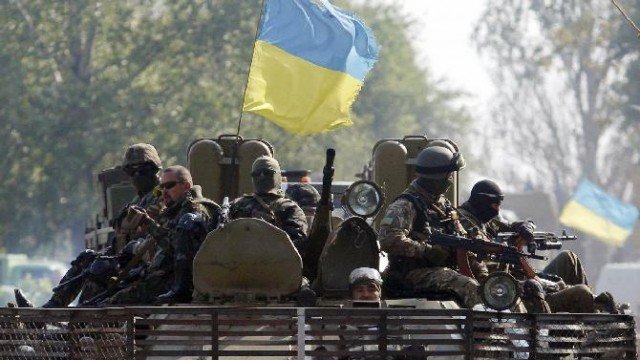Pro-Russian rebels in eastern Ukraine have agreed to begin to pull back heavy weapons from the frontline, Russian General Alexander Lentsov, who is involved in implementing the truce, has said.
Gen. Alexander Lentsov said the pro-Russian rebels had signed the orders to complete the withdrawal over the next two weeks, starting from Sunday.
It is not clear whether the move will be reciprocated by Ukraine.
This comes as Ukraine and the separatists exchanged 191 prisoners, a key part of the Minsk ceasefire deal.
It was the first step carried out successfully under the terms of the February 12 agreements signed in Minsk, brokered by France and Germany.
The exchange came as Secretary of State John Kerry said Washington was considering “serious sanctions” against Russia following breaches of the truce, and that a decision would be made in the coming days.
Kremlin spokesman Dmitry Peskov said sanctions would not help solve Ukraine’s crisis.
Meanwhile, thousands of Ukrainians – as well as a number of European leaders – are expected to take part in a “dignity march” in the capital Kiev on February 22, remembering the victims of sniper fire during protests last February.
Nearly 5,700 people have died since the fighting erupted last April Ukraine’s eastern Donetsk and Luhansk regions, according to the UN.
This followed Russia’s annexation of Ukraine’s southern Crimea peninsula.
Gen. Alexander Lentsov, a Russian member of the Joint Centre for Control and Co-operation (JCCC), said: “We have designated February 22 as <<D-Day>> as determined by the agreement from all sides. So from tomorrow [February 22] we will within the period of 14 days observe the agreement on the pullback of heavy weapons.”
He said the leaders of the self-proclaimed rebel Luhansk and Donetsk people’s republics had already signed the orders.
“We hope for Kiev’s participation and help first and foremost,” the general added.
Petro Kanonik, a Ukrainian member of the JCCC, said Kiev had been informed of the rebel move, according to Ukraine’s Ukrainska Pravda website.
The pullout process had been due to start on February 17 and completed by March 3, but Gen. Alexander Lentsov said it would now take until March 7.
Ukraine and rebel forces accuse each other of multiple breaches of the truce, and there were reports of violations around Donetsk and the port city of Mariupol on February 21.
Yesterday, Ukraine’s military and the rebels completed the first exchange of prisoners after the ceasefire. A total of 139 Ukrainian soldiers were freed and 52 rebels.
Ukrainian President Petro Poroshenko tweeted the news of the prisoner exchange, which took place near the front line town of Zholobok.
Some of the government soldiers were wounded and walking on crutches.
Petro Poroshenko originally said 140 soldiers would be freed, and Ukrainian officials said one more soldier would be released in the coming days.
[youtube Mdefj-yoLfc 650]
Ukraine will start the withdrawal of heavy weaponry from separatist rebel lines in the east, the military says.
The two sides agreed on September 20 to set up a buffer zone in eastern Ukraine, more than a fortnight after a shaky ceasefire came into force.
Although the truce is still in place, clashes have continued around the cities of Donetsk and Mariupol.
More than 3,000 people have died since fighting broke out in the two regions of Donetsk and Luhansk in April.
Ukraine’s parliament passed a bill last week granting three-year “self-rule” to parts of the Donetsk and Luhansk regions – a decision condemned by some lawmakers as “capitulation”.
Under the terms of the nine-point deal agreed in Belarus, both the pro-Russian rebels and Ukrainian forces are to pull back their heavy artillery 9.5 miles from the line of engagement, creating a 20 miles buffer zone.
Ukrainian National Security and Defense Council spokesman Col Andriy Lysenko said pro-Russian rebels had for their part begun moving their heavy artillery, but it was “not as massive as we expected”.

Ukraine will start the withdrawal of heavy weaponry from separatist rebel lines in the east (photo Reuters)
Artillery and armored vehicles with a caliber greater than 100mm would be moved, but all other units and their weapons would remain in place, he said.
According to the deal, military aircraft are banned from flying over the conflict zone and “foreign mercenaries” are to be withdrawn on both sides.
Foreigners are known to be fighting on both sides and Russia has repeatedly insisted that any of its citizens fighting alongside separatists in Ukraine are doing so in a private capacity.
Checkpoints manned by Ukrainian forces had come under heavy shelling at Donetsk airport and near Mariupol, Ukrainian media reported on Monday.
Col. Andriy Lysenko said that two servicemen had been killed in the past day.
Eastern Ukraine’s regions, which are controlled by pro-Russian rebels, have been granted self-ruled, as well as an amnesty for the fighters themselves.
The measures voted by Ukraine’s parliament are in line with the September 5 cease-fire agreement signed by President Petro Poroshenko.
The European and Ukrainian parliaments have also voted to ratify a major EU-Ukraine association agreement.
The rebels have been battling Ukrainian government forces since their seizure of eastern regions bordering Russia.
Ukraine and the West have accused Russia of backing the rebels with soldiers and heavy weapons. Russia denies doing so.
According to the UN, at least 3,000 people have been killed in the five-month conflict and more than 310,000 internally displaced in Ukraine.
The amnesty affects rebels in Donetsk and Luhansk regions, but does not cover the shooting down of the MH17 passenger plane in July.
Western leaders believe rebels shot down the Malaysia Airlines jet with a Russian missile – a charge the rebels and Russia deny.
Rebels accused of other “grave” crimes will not be covered by the new amnesty either.

Eastern Ukraine’s regions, which are controlled by pro-Russian rebels, have been granted self-ruled, as well as an amnesty for the fighters themselves
The rebels have controlled most of Donetsk and Luhansk regions since April. They launched their uprising soon after Russia annexed Ukraine’s Crimea peninsula.
On September 16, there was heavy shelling around the government-held airport in Donetsk, despite a fragile cease-fire.
Meanwhile Russia is preparing to send extra troops to Crimea, Russian media reported.
They quoted Defense Minister Sergei Shoigu as saying that deploying “proper and self-sufficient forces” there was a top priority in light of the “presence of foreign military in the immediate vicinity of our borders”.
The EU-Ukraine agreement ratified on Tuesday lies at the root of Ukraine’s crisis.
It was President Viktor Yanukovych’s refusal to sign the deal in November last year that triggered mass protests and his eventual fall from power.
The votes ratifying the agreement took place simultaneously, with a live video link-up between the parliaments in Brussels and Kiev.
Both President Petro Poroshenko and the President of the European Parliament, Martin Schulz, called it a historic day.
However, negotiations with Russia last week led to the free-trade part of the agreement being postponed until 2016.
There are fears in Ukraine that Russia will still try to scupper the deal.
The amnesty law passed by the Ukrainian parliament means pro-Russian separatists taken prisoner in the fighting should now be released.
Rebels holding government buildings in the east are now supposed to leave them, hand over captured Ukrainian soldiers and other prisoners and surrender their weapons.
However, many of the rebels are demanding full independence, and speak of creating a new state called “Novorossiya”, something Russian President Vladimir Putin has also mentioned in speeches.
Andre Purgin, a rebel leader in the eastern city of Donetsk, told AFP news agency that the eastern region “no longer has anything to do with Ukraine”.
“Ukraine is free to adopt any law it wants,” he is quoted as saying.
“But we are not planning any federalism with Ukraine.”
Andre Purgin nonetheless said the legislation was a “positive signal because it marks Kiev’s return to reality”.
President Petro Poroshenko said the proposals would guarantee the “sovereignty, territorial integrity and independence” of Ukraine, while paving the way for decentralization.
Ukraine association agreement (officially called the AA/DCFTA) would make Ukraine compliant with EU standards in the areas of human rights, security and arms control, and would remove trade barriers.
The pact has been signed, but Russia opposes the free-trade provisions, saying its market could be flooded with cheap EU goods shipped via Ukraine.
Until 2016 Ukraine will maintain its existing restrictions on imports from the EU, while enjoying full access to the EU market for its own exports.
In return, Russia has pledged to maintain favorable trade rules in place for Ukraine as an ex-Soviet republic.
Yet the crisis has severely hit Russia-Ukraine trade ties, with the two neighbors imposing economic sanctions on each other.
[youtube qQVOufilgLc 650]



